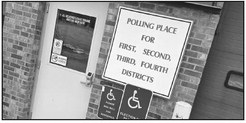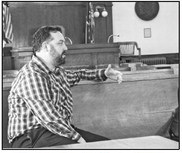Get informed and vote in the April election
Officially, the State Supreme Court is nonpartisan.
Wisconsin’s founding fathers felt that justices should be above party politics and should instead use their own wisdom and intelligence in ruling on questions of the law.
Wisconsin’s founders were, if nothing else, idealists who had faith in the selflessness of individuals to make the best choice rather than the most politically expedient one. The historical record of the nearly 175 years of jurisprudence shows that often that faith was misplaced.
On April 4 Wisconsin voters will select a new judge to serve on the state Supreme Court. Both candidates who advanced through the primary come with a lengthy list of credentials and qualifications to serve on the state’s highest bench.
This editorial isn’t to tell you who to vote for, that is a burden that democracy puts on each voter to decide in their hearts and minds. Rather, it is to highlight the issues at stake in this election.
Reproductive rights are among the major issues the next court will have to decide. In particular, the court will decide if the state’s 1849 abortion ban stands or if, as a lawsuit filed by Gov. Tony Evers and Attorney General Joshua Kaul argues, it has been superseded by legislation and regulations on abortions passed in more recent decades.
If history is any judge, the next supreme court will be asked to weigh in on setting political districts. Redistricting allows those in power to cherry-pick their constituents by redrawing boundaries. Gerrymandering has been used across the country by the party in power to attempt to remain in power regardless of the will of the people. The courts have long served as the neutral arbiter to balance politics with public interest. With complaints that the current districts have gone too far in protecting those in power while marginalizing dissenters, the courts will be involved in setting boundaries for some time to come.
In 2011, Act 10 was passed under Gov. Scott Walker. As the legislation intended, it gutted public employee unions by ending collective-bargaining rights for most public employees. There is a high likelihood that a case could be brought to attempt to overturn that law based on the right of people to freely associate and other legal grounds. Such a move would have wide-ranging impacts at every level of state government by giving state workers a voice at the bargaining table.
As State Sen. Cory Tomcyzk noted in a recent listening session in Medford, state government is holding its figurative breath waiting on the outcome of the election to see if the current conservative majority is maintained or if the court will flip to a more liberal leaning majority.
It will be up to the voters to become informed about where the candidates stand on these and other issues and to make a decision.
The April 4 supreme court election is a proxy referendum on Act 10, abortion rights, electoral mapping, and a number of other statewide issues with long-term consequences.
Elections provide an opportunity for citizens to have their voices heard on the issues of importance to them. They give all citizens an opportunity to pick leaders who will guide policy for years to come. Participation in elections is an integral part of a healthy democracy.
All elections are important. Some elections, such as the April 4 Supreme Court election, are more important than others.
Don’t let your opportunity to weigh in on important public policy slip away. Get informed and vote.




